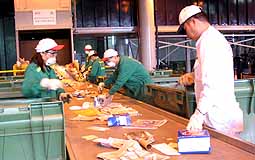 |
One man's junk... : Dry waste is sorted at the Waste Separation Pilot Facility, and sold to recyclers by tender - proving that properly sorted waste has value in the market. |

|
The first eight months of a 12-month pilot scheme at four housing estates have seen about a tonne of dry waste a day collected and sold by tender to recyclers - proving there is value in sorting waste, the Secretary for Environment, Transport & Works told the Legislative Council today.
Dr Sarah Liao told lawmakers that the scheme would be reviewed upon its completion in March to examine its feasibility, logistics and cost-effectiveness.
She stressed that, to achieve sustainable development, Hong Kong cannot reply on a single waste disposal method.
To reduce waste that must be disposed at landfills, the bureau has been actively promoting waste separation at source.
Commercial and industrial waste is primarily collected by cleaning contractors who deliver it to recyclers.
Several means available to separate waste at source
The public can separate waste by using the separation bins in public places and housing estates, usually for paper, plastic and aluminium.
The pilot scheme at the four housing estates requires residents to sort their garbage into wet and dry waste. Dry waste is waste that is dry and un-contaminated. Recyclables such as waste paper, metal cans, plastic bottles, floppy disks, batteries, glass bottles, old clothes, baskets, pens and shoes are some examples. Wet waste is dirty waste that is not accepted in the dry waste bag. It includes food waste, contaminated paper and tissue, containers with food scraps, diapers and used personal hygiene items.
Most of the dry waste that is recovered are exported since only a few local recyclers actually carry out recycling locally, Dr Liao said.
Landfill needs still under evaluation
While such projects help relieve the pressure on landfills, the Government still must examine the feasibility of extending existing landfills or developing new ones - as well as adopting new waste-treatment facilities.
In April 2002, the Government called for expressions of interest from the local and international waste management industry for technology options to develop large-scale waste-treatment facilities in Hong Kong.
An advisory group, made up mostly of non-officials, was set up in late 2002 to help evaluate the proposals received. They are reviewing the technology options and will make recommendations to the Government for public consultation.
Industry's development could spark job growth
The recycling industry here employs about 3,000 staff on a full-time basis, and another 20,000 who are casual labourers such as cleaners.
To facilitate and promote waste recovery - triggering job creation in the recycling industry - the Government is taking the following measures:
* continuously supporting and promoting waste-recovery business and community activities;
* trying out different forms of waste-recovery methods;
* strengthening public education and publicity on waste recovery;
* providing suitable land for lease to the recycling industry;
* planning to establish a 20-hectare recovery park in Tuen Mun to provide long-term land for recycling operations; and
* injecting $100 million into the Environment & Conservation Fund, for district organisations and green groups to organise community waste-recovery projects.
She cautioned that, because the recycling industry has about 30% spare capacity at the moment, its further development may not increase job opportunities instantly nor significantly.
Go To Top
|



